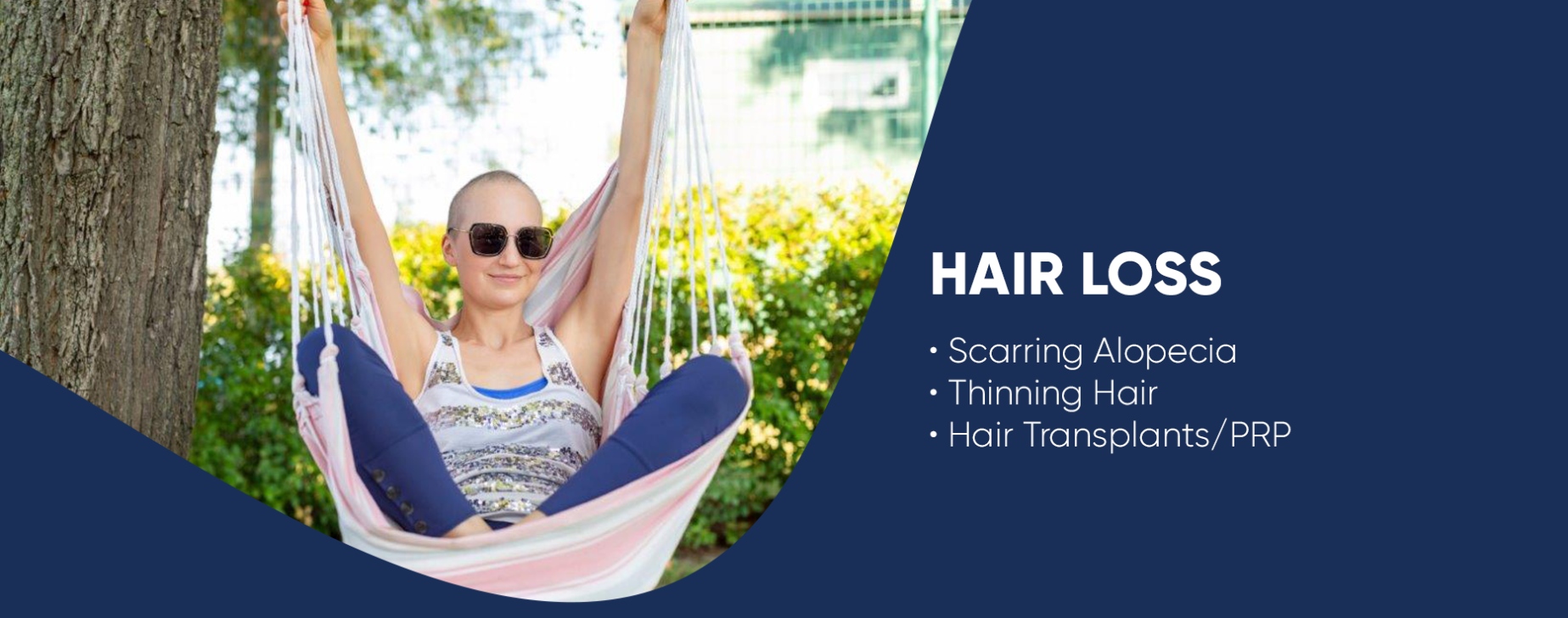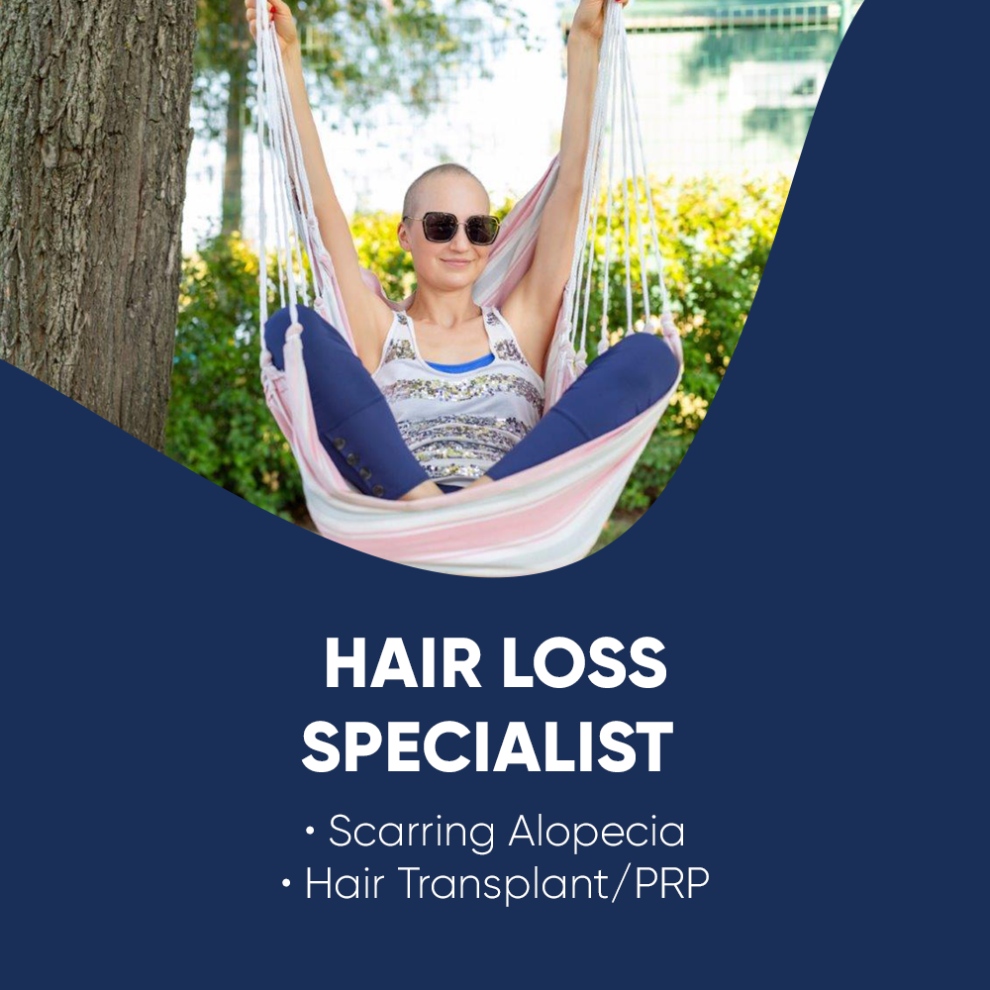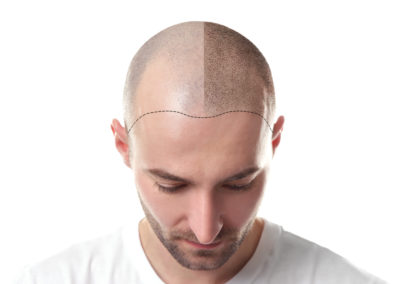

What is hair loss?
Hair loss (alopecia) occurs when people lose hair, most commonly from their scalp.
It can also affect any hair-bearing skin including the body, beard or eyebrows.
Hair loss can be temporary or permanent.
What are the symptoms of hair loss?
- Noticeable clumps of hair in the shower on the hair brush. Some daily hair loss is normal about 50 to 100 hairs daily, but anything further warrants a discussion with your GP or dermatologist
- Generalised thinning or thinning of hair at the hairline, temples and top of the head (patterned hair loss) with or without frontal hairline recession.
- Men may notice it at the hairline while women may notice a broadening part.
- Circular or patchy bald spots that may also be itchy and painful just before the hair falls out.
- Sudden clumps of hair, often after an emotional shock or medical illness that generally grows back after 9 to 12 months.
What causes hair loss?
- Hair loss can be genetic, related to medical conditions or fluctuating hormones and most commonly is an ageing disease.
What are the different types of hair loss?
- There are varying types of hair that fall into the ‘scarring’ and ‘non-scarring’ categories.
- Non-scarring alopecias are the most common.
- Although there is no damage to the skin surface (resulting in a scar), there still may be some permanent hair loss.
What is “non-scarring” alopecia?
- Androgenetic alopecia – this is sometimes referred to as ‘patterned hair loss’ and is the most frequent type of baldness.It can occur at any age and about 50-60% of men will have had hair loss resulting in baldness by the age of 70, while one in 5 will not have any significant balding despite the advancing years.
- Although there is no damage to the skin surface (resulting in a scar), there still may be some permanent hair loss.
- Hair loss in women is not usually so severe or common but about 1 in 2 women will experience some significant hair loss by the age of 70.
- Alopecia areata – an autoimmune condition
- Telogen effluvium – often caused by a stressful event, following pregnancy or by medication and takes approximately
3 – 6 months to appear after the triggering event. - Certain medications and recreational drugs that may be related to hair loss include those used for heart problems, high blood pressure, depression, cancer, and arthritis.
- Tinea Capitis – which is hair loss caused by ringworm infection
-
Trichotillomania (hair pulling habit) – a psychological disorder that involves a compulsive urge to pull out hair from the scalp and eyebrows, despite trying to stop.
-
Endocrine abnormality hair loss – eg thyroid abnormality that can cause scar loss.
What is scarring alopecia?
Scarring Alopecias are generally a result of inflammatory hair loss disorders and are far less common than non-scarring alopecia, probably (around 3-7% of all alopecia).
They are equally common in men and women.
This type of alopecia causes bald patches on the scalp due to a permanent destruction of hair follicles and hair cannot be regrown. It quite often starts as non-scarring alopecia.
Other symptoms include itching scalp, burning scalp, discharge from the scalp and patches of rough and scaly skin, blisters and crusting.
Scarring alopecia may start as one or more permanent patches that then join to produce bigger patches often with a smooth and shiny appearance.
Scarring alopecia needs to be aggressively managed, as it is generally permanent and irreversible.
Often treatment is to manage the painful symptoms and inflammation and maintain the hair that is left.
Hair loss can cause huge psychological devastation and one study from the Royal Australian College of General Practitioners (RACGP)*1 found that 52% of women were “extremely upset” by baldness, compared to 28% of men – with more than 40% of women experiencing marital problems and 64% career difficulties attributed to their hair loss.
How can I prevent hair loss?
Some types of hair loss cannot be prevented but can be treated when it appears.
However, following these tips may help you avoid the non-scarring and more preventable types of alopecia
- Improve nutrition. Like any other part of your body, your tresses need fuel, including nutrients such as B-Vitamins, zinc, iron, and protein to be healthy and grow.
Sudden weight loss, bariatric surgery or chronic calorie restriction, such as in anorexia nervosa, is also linked to hair loss. Ask your doctor about supplements for hair loss. - Chop and change. Change your hairstyle and part every few weeks and avoid the tension in one area of the scalp.
- Hair loss in women is not usually so severe or common but about 1 in 2 women will experience significant hair loss by the age of 70.
- Be gentle with your hair. Avoid tugging, use a wide-toothed comb to help prevent pulling out hair.
- Avoid harsh treatments such as peroxide, perms, hot rollers, curling irons, dyes.
- Quit smoking. Smoking impairs the hair growth cycle and can trigger severe hair fall out.
-
Be chemo savvy. If you are having chemotherapy, ask your doctor about a cooling cap that can help you retain more of your hair.
What are the treatments for hair loss?
- Treatment of alopecia will depend on the severity and type of hair loss.
- Sometimes it is possible to regrow the hair that has fallen out and in other cases such as scarring alopecia which is permanent and irreversible, the treatment goal is to preserve the hair that remains.
- It usually takes 6 – 8 months before a measurable improvement can be seen from most hair treatments so you need to be patient.
- Treatments include lifestyle modifications, hair transplant, PRP and a range of topical and oral medications.
- To find out about Aurora’s signature hair transplants see here.
What questions should I ask my hair doctor?
Aurora Dermatology director Dr Parisa has a special interest in hair loss and is committed to providing patients with passionate and effective treatments.
Here are some questions you can ask her.
- What is causing my hair loss?
- Are there other possible causes rather than genes or ageing?
- What kinds of tests do I need for hair loss?
- Is my hair loss permanent or will it grow back?
- How long will it take for hair to grow back with hair loss?
- Will it have a different texture after it grows back?
- What is the best course of action?
- Should I change my diet or hair care routine?
- Are there any restrictions that I need to follow?
- What will the hair loss treatment cost and will Medicare or my insurance cover seeing a specialist?
- Is there a generic alternative to the hair loss medicine you’re prescribing me?
- Do you have any brochures or other printed material that I can take home with me?



